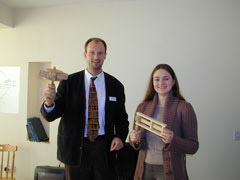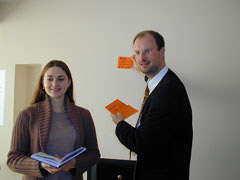Sitemap | Imprint
Teaching Culture!
Events > Intercultural Lectures
Intercultural Lectures at the first project meeting at Achill
INTERCULTURAL LECTURE 2: “Without words – animal sounds in different cultures – or - Culture as Software of the mind"

(Laurent Borgmann and Indre Cesnakauskaite)
You might think that the same animals make the same sound in every culture, whatever country they live in. But actually, while the Swedish firmly believe that pigs “oink”, Germans call the sound they make “grunzen”, while in Lithuania, they sound like “kriu-kriu”. Indre Cesnakauskaite (Lithuania) and Laurent Borgman (Germany) used such onomatopoetic differences to introduce us to Hofstede’s concept of culture being the software of the mind. Indre opened the lecture by singing a Lithuanian song and making us guess what animal it was about. After that, participants had to imitate “Lithuanian” animal sounds, while the others had to guess which animals made what noise.

Laurence then pointed out that obviously there is a difference in cultural softwares of the mind, which make people from different countries hear different sounds when they listen to the same animals. Exploring the idea of different software, participants were asked to look at different means to save data - very old floppy disks of 5 ¼ inches , tapes like those our parents used to use, brand new mp3 players – and find out which are compatible and what interfaces are needed to make them communicate with each other. We realized very quickly that sometimes you have to make quite an effort to make different software compatible or even find an intermediary between the two, just as you have to think about how to make different cultures compatible. If we accept the metaphor of “software of the mind” what are the updates that most of us get but others miss? How many people in a culture subscribe to the update and how many give up and stay with their old software? We explored this phenomenon discussing the arrival of the internet and the legal acceptance of homosexual marriages in some countries. This showed that even younger people do not immediately switch their software when new versions are available.
by Alexandra Haas